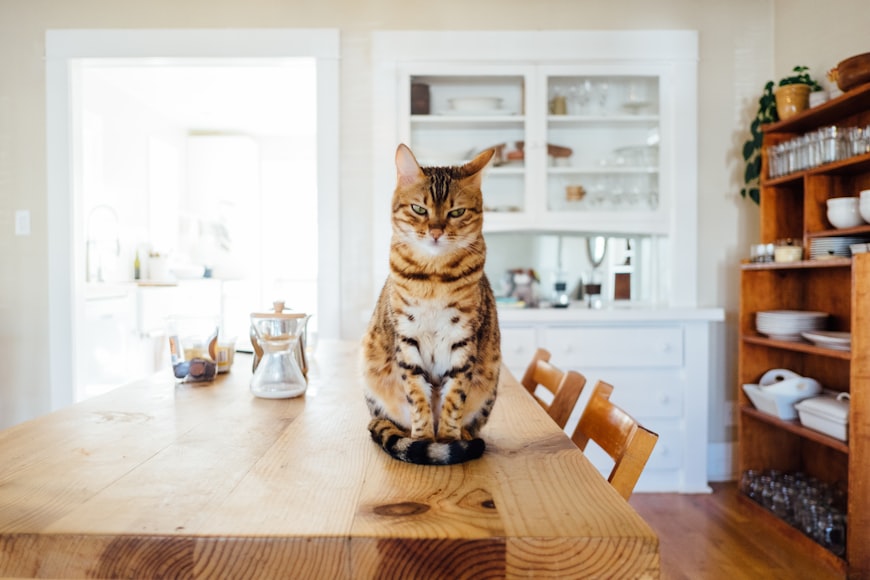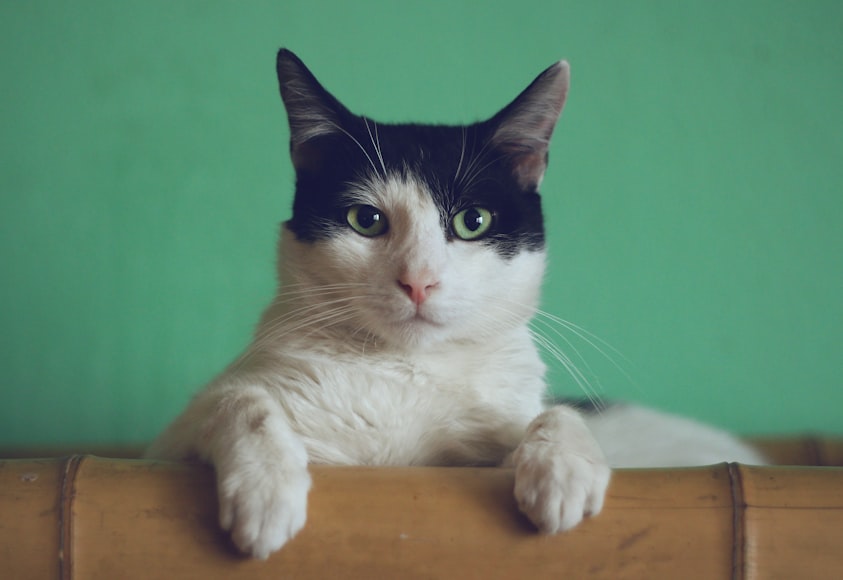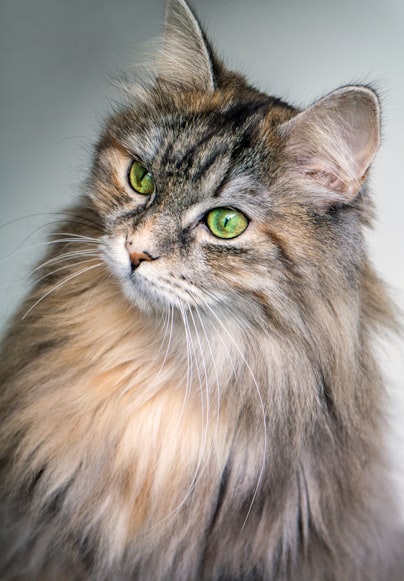Foods to Soothe an Upset Cat’s Stomach

Cats, with their curious nature and sensitive digestive systems, are prone to experiencing occasional stomach distress. Whether it’s due to changes in diet, stress, or a gastrointestinal infection, an upset stomach can cause discomfort and affect your cat’s overall well-being. Fortunately, there are several dietary options you can use to soothe your feline friend’s digestive system.
Identifying an Upset Stomach
Before attempting to treat an upset stomach, it’s important to recognize the signs. Some common symptoms include:
- Vomiting
- Diarrhea
- Loss of appetite
- Lethargy
- Abdominal pain
- Excessive grooming
Diarrhea and Vomiting
If your cat is experiencing diarrhea or vomiting, the most important step is to prevent dehydration. Offer your cat small amounts of water or electrolyte solution frequently. Avoid giving your cat milk or dairy products, as these can further irritate the digestive tract.
Bland Diet
The first step in soothing an upset cat’s stomach is to provide a bland diet. This involves feeding foods that are easy to digest and will not put additional strain on the digestive system. Some bland diet options for cats include:
- Boiled chicken (remove skin and bones)
- White rice (plain, no seasonings)
- Plain canned pumpkin (not pumpkin pie mix)
- Low-fat cottage cheese
- Scrambled eggs (plain)
Gradual Reintroduction of Food
Once your cat has been on a bland diet for 24-48 hours and their symptoms have improved, you can gradually reintroduce their regular food. Start by mixing small amounts of their regular diet into the bland food. Gradually increase the amount of regular food over several days until they are back on their normal diet.
Other Dietary Considerations
In addition to a bland diet, there are several other dietary considerations you can make to soothe your cat’s stomach:
- Probiotics: Probiotics are live microorganisms that can help restore the balance of healthy bacteria in the digestive tract. You can find probiotics in supplements or in some fermented foods, such as yogurt.
- Fiber: Fiber helps regulate digestion and prevent constipation. Good sources of fiber for cats include oatmeal and pumpkin.
- Avoid fatty foods: Fatty foods can irritate the digestive tract and worsen symptoms of an upset stomach.
- Avoid spicy foods: Spicy foods can also irritate the digestive tract.
- Provide fresh water: Keep your cat’s water bowl filled with fresh, clean water at all times.
- Avoid sudden diet changes: Making sudden changes to your cat’s diet can upset their digestive system.
When to Seek Veterinary Care
While providing a bland diet and other home remedies can often help soothe an upset cat’s stomach, it’s important to seek veterinary care if your cat’s symptoms persist or worsen. Signs that indicate a need for veterinary attention include:
- Vomiting or diarrhea for more than 24 hours
- Blood in vomit or stool
- Lethargy or loss of appetite
- Abdominal pain or discomfort
- Difficulty breathing
Conclusion
Providing appropriate dietary care is crucial for soothing an upset cat’s stomach. By offering a bland diet, gradually reintroducing their regular food, and considering other dietary modifications, you can help your feline friend recover from digestive distress and get back to feeling their best. However, it’s important to be mindful of the underlying cause of the upset stomach and seek veterinary care if necessary.
Bland Diet

As a pet blogger, you’re no stranger to the importance of a balanced diet for our furry companions. But what happens when your feline friend starts experiencing digestive issues? An upset stomach can be uncomfortable and disruptive, so it’s crucial to know what foods to offer them to help alleviate their symptoms. One effective solution is the Bland Diet.
Understanding the Bland Diet
The Bland Diet is a temporary dietary modification designed to soothe an irritated gastrointestinal tract. It consists of bland, easily digestible foods that minimize inflammation and promote healing. By limiting the intake of fiber, fat, and spices, this diet helps reduce further irritation and allows the stomach and intestines to rest and repair.
Suitable Foods for the Bland Diet
Here are the recommended foods for a cat with an upset stomach:
-
Boiled Chicken or White Fish: These lean proteins are low in fat and easy on the stomach. Avoid using chicken or fish with skin or bones.
-
Plain White Rice: Rice is a gentle carbohydrate that helps bind stool and absorb excess fluid, providing a calming effect on the digestive system.
-
Baby Food (Plain or with Pumpkin): Pureed baby food (without added salt or sugar) can be a soothing and nutritious option. Pumpkin, in particular, is rich in fiber and helps promote regularity.
How to Introduce the Bland Diet
Start by offering small portions of the bland foods to your cat every few hours. Monitor their response and gradually increase the amount and frequency of feedings as their symptoms improve. It’s important to avoid overfeeding, as this can further irritate their stomach.
If your cat refuses to eat or exhibits signs of worsening symptoms, such as vomiting, diarrhea, or abdominal pain, discontinue the Bland Diet and consult your veterinarian immediately.
How Long to Follow the Bland Diet
The duration of the Bland Diet will vary depending on the severity of your cat’s upset stomach. Typically, 2-3 days of following this diet should be sufficient to alleviate their symptoms. Once their digestion has normalized, you can gradually reintroduce their regular food.
Additional Tips
- Make sure your cat has constant access to fresh water.
- Keep their environment clean and stress-free.
- Avoid giving them treats or table scraps.
- Consider using a probiotic supplement to replenish beneficial bacteria in their digestive tract.
Conclusion
The Bland Diet is an effective way to help alleviate an upset stomach in cats. By providing your feline friend with bland, easily digestible foods, you can help soothe their digestive system, reduce inflammation, and promote healing. Remember to monitor their response and consult your veterinarian if their symptoms persist or worsen. With a little care and attention, your furry friend will be back on their paws in no time!
Electrolyte Solution

Gastrointestinal upset is a common problem in cats, and it can be caused by a variety of factors, including diet changes, stress, parasites, and infections. When a cat is vomiting or has diarrhea, they can quickly become dehydrated and lose electrolytes, which are essential minerals that help regulate fluid balance and other bodily functions.
Electrolyte solutions can help to replenish lost fluids and electrolytes, and they can be a helpful addition to supportive care for cats with an upset stomach. There are a few different types of electrolyte solutions that you can give your cat, including:
- Pedialyte or similar: Pedialyte is a commercially available electrolyte solution that is designed for human infants, but it can also be used in cats. It is important to choose a Pedialyte solution that is unflavored and does not contain any added sugar.
- Coconut water: Coconut water is a natural electrolyte solution that is rich in potassium and other minerals. It is a good option for cats who are not drinking well, as it can help to keep them hydrated.
- Meat broth: Meat broth is another good source of electrolytes, and it can also be helpful in stimulating a cat’s appetite. Be sure to choose a meat broth that is low in sodium and fat.
To give your cat an electrolyte solution, you can use a syringe or a dropper. Start by giving your cat a small amount of the solution, and then gradually increase the amount as needed. Do not give your cat more than 1 ounce of electrolyte solution per pound of body weight per day.
If your cat is vomiting or has diarrhea, it is important to contact your veterinarian. Your veterinarian will be able to determine the cause of your cat’s upset stomach and recommend the best course of treatment.
In addition to electrolyte solutions, there are a few other things that you can do to help your cat with an upset stomach, including:
- Offer your cat small, frequent meals. This will help to reduce the amount of stomach upset that your cat experiences.
- Feed your cat a bland diet. A bland diet is easy to digest and will help to soothe your cat’s stomach. Examples of bland foods include boiled chicken, white rice, and oatmeal.
- Keep your cat hydrated. Make sure that your cat has access to plenty of fresh water. You can also offer your cat electrolyte solutions to help them stay hydrated.
- Provide a comfortable place for your cat to rest. Your cat may be feeling nauseous or uncomfortable, so it is important to provide them with a quiet, comfortable place to rest.
If your cat’s upset stomach does not improve after a few days, or if your cat is vomiting or has diarrhea, it is important to contact your veterinarian.
Probiotics

As a pet parent, it’s disheartening to see your beloved feline companion suffering from digestive issues. Upset stomachs, marked by vomiting, diarrhea, and abdominal discomfort, can be a common ailment among cats. While minor digestive upsets may resolve on their own, persistent or severe symptoms warrant veterinary attention.
One important aspect of addressing an upset stomach in cats is providing them with appropriate and safe home remedies. While human remedies may seem tempting, it’s crucial to avoid giving your cat medications or foods not specifically formulated for felines.
Among the safe and effective options you can consider for your cat with an upset stomach are probiotics. Probiotics are live microorganisms that, when consumed in adequate amounts, confer health benefits to the host. They play a vital role in maintaining a healthy balance of gut microbiota, essential for proper digestion, nutrient absorption, and immune function.
In particular, three types of probiotics have been found to be beneficial for cats with digestive issues:
Yogurt (Plain, Unsweetened)
Yogurt is a fermented dairy product rich in beneficial bacteria, including Lactobacillus and Bifidobacterium. These bacteria help to restore the balance of gut microbiota, alleviate inflammation, and improve digestion. When choosing yogurt for your cat, opt for plain, unsweetened varieties to avoid unnecessary sugar intake.
Kefir
Kefir is a fermented milk drink that originates from the Caucasus Mountains. It contains a diverse array of probiotics, including Lactobacillus, Bifidobacterium, and Streptococcus. These bacteria can help to improve digestion, reduce inflammation, and boost the immune system. When offering kefir to your cat, dilute it with water to reduce its lactose content.
Probiotic Supplements
Probiotic supplements are specifically designed to provide a concentrated dose of beneficial bacteria. They are available in various forms, including capsules, tablets, and powders, and can be administered orally or mixed into food. When choosing a probiotic supplement for your cat, look for products that contain a blend of different strains of bacteria and that adhere to specific quality standards.
Additional Tips for Cats with Upset Stomachs:
In addition to probiotics, other home remedies can help alleviate digestive discomfort in cats:
- Bland Diet: Offer a bland diet of boiled chicken or white rice for a few days to rest the digestive tract.
- Electrolytes: Provide your cat with oral rehydration solutions or plain Pedialyte to replenish lost fluids and electrolytes.
- Warm Compress: Apply a warm compress to your cat’s abdomen to soothe discomfort.
- Rest: Encourage your cat to rest quietly in a warm, comfortable environment.
- Vet Consultation: If your cat’s digestive symptoms persist or worsen, consult with your veterinarian promptly. Underlying medical conditions or dietary intolerances may require specific treatment.
Remember, while probiotics can be beneficial for cats with upset stomachs, they should not replace veterinary care. If your cat experiences persistent or severe digestive issues, it’s essential to seek professional advice to determine the underlying cause and receive appropriate treatment.
Ginger
As pet owners, it’s heartbreaking to see our beloved feline companions suffering from an upset stomach. While cats are generally resilient creatures, digestive issues can cause significant discomfort and distress. Understanding what you can and cannot give your cat during these times is crucial for their well-being.
Fortunately, there are several safe and effective remedies available to help soothe a cat’s upset stomach. One of the most widely recommended options is ginger.
The Power of Ginger
Ginger has been used for centuries in traditional medicine for its anti-nausea and vomiting properties. Its active compounds, such as gingerol and shogaol, have been shown to stimulate gastric emptying and reduce inflammation in the digestive tract. This makes ginger an excellent choice for cats experiencing digestive distress.
How to Give Ginger to Your Cat
1. Brewed Ginger Tea:
- Brew a cup of ginger tea using fresh ginger root or tea bags.
- Let it cool to room temperature.
- Administer the tea using a dropper or syringe, offering small amounts at a time.
2. Ginger Supplements:
- Consult with your veterinarian before giving your cat ginger supplements.
- Choose supplements specifically formulated for cats, as human products may contain harmful ingredients.
- Follow the dosage instructions carefully.
Other Home Remedies
In addition to ginger, there are other home remedies that can help ease an upset stomach in cats:
- Plain Yogurt: Yogurt contains probiotics, which can help restore the balance of good bacteria in the digestive tract.
- Pumpkin Puree: Canned pumpkin is rich in fiber, which can help absorb excess water and firm up stools.
- Bland Diet: Switch your cat to a bland diet of cooked chicken or fish with white rice. Avoid giving them high-fat or spicy foods.
When to See a Veterinarian
While most upset stomachs in cats can be treated at home, it’s important to seek veterinary attention if:
- Vomiting or diarrhea persists for more than 24 hours
- Your cat shows signs of dehydration, such as dry gums or lethargy
- Blood or mucus is present in the vomit or stools
- Your cat is unable to keep food or water down
Conclusion
If your cat is experiencing an upset stomach, ginger can be a safe and effective remedy. Brewed ginger tea or ginger supplements can help soothe nausea and vomiting. Other home remedies, such as plain yogurt, pumpkin puree, and a bland diet, can also provide relief. However, it’s crucial to monitor your cat’s condition closely and seek veterinary attention if necessary. By providing proper care and attention, you can help your feline friend recover quickly and enjoy a healthy and happy life.
Marshmallows
As pet owners, we all want to show our furry companions love and affection. Sometimes, we may think about sharing our favorite treats with them, even if they’re typically not recommended for canine consumption. One such treat that often raises questions is marshmallows.
Marshmallows are a popular confectionery made from sugar, gelatin, corn syrup, and water. They are often enjoyed by humans for their soft, fluffy texture and sweet taste. But what about dogs? Can these sugary treats be safely given to our canine friends? Let’s delve into the safety and potential benefits of marshmallows for dogs.
Are Marshmallows Safe for Dogs?
The short answer is yes, plain, unfrosted marshmallows are generally considered safe for dogs in moderation. They do not contain any toxic ingredients that could be harmful to your pet. However, there are a few things to keep in mind before offering your dog a marshmallow:
- Sugar Content: Marshmallows are high in sugar, which can lead to weight gain and other health problems if consumed in large amounts. Limit your dog’s marshmallow intake to occasional treats to avoid these issues.
- Choking Hazard: Whole marshmallows can be a choking hazard for dogs, especially small breeds. Always break marshmallows into smaller pieces before giving them to your dog.
- Xylitol: Be sure to check the ingredient list of the marshmallows you purchase. Some marshmallow brands may contain xylitol, an artificial sweetener that is toxic to dogs.
Potential Benefits of Marshmallows for Dogs
In addition to being a safe treat, marshmallows may also provide some potential benefits for dogs:
- Soothe an Upset Stomach: Marshmallows are known for their soothing properties. The gelatin in marshmallows can coat the stomach lining and provide a protective barrier against stomach acids. This can help to alleviate stomach discomfort and diarrhea.
- Provide Energy Boost: Marshmallows contain carbohydrates, which can provide your dog with a quick burst of energy. This can be especially beneficial for dogs who are active or have a high energy level.
- Hydration: Marshmallows contain water, which can help to keep your dog hydrated, especially during hot weather or after exercise.
How to Safely Give Marshmallows to Your Dog
If you decide to give your dog a marshmallow, follow these guidelines to ensure their safety:
- Choose Plain Marshmallows: Opt for plain, unfrosted marshmallows without any additional ingredients.
- Break into Pieces: Break the marshmallow into small pieces to prevent choking.
- Limit Intake: Marshmallows should be given only as occasional treats. A few small pieces once or twice a week is sufficient.
- Monitor Your Dog: Observe your dog after giving them a marshmallow to ensure they do not show any signs of discomfort or allergies.
Conclusion
While marshmallows are generally safe for dogs in moderation, it’s important to be mindful of the potential risks associated with this treat. Limit your dog’s marshmallow intake, break them into small pieces, and avoid marshmallows containing xylitol. When given as an occasional treat, marshmallows can provide your dog with a soothing and energizing snack while also contributing to their hydration. However, it’s always best to consult with your veterinarian before giving your dog any new food, including marshmallows.
Slippery Elm
As dedicated pet parents, we all want the best for our feline companions. When our kitties experience digestive distress, it can be a distressing and uncomfortable time for both them and us. While there are various over-the-counter medications available for cat upset stomachs, many pet owners prefer a more natural approach. One such remedy that has gained popularity in recent years is slippery elm.
What is Slippery Elm?
Slippery elm (Ulmus rubra) is a tall, deciduous tree native to North America. Its bark has been used for centuries in traditional herbal medicine for treating various ailments, including digestive problems. The bark contains a substance called mucilage, which gives it its slippery texture.
How Slippery Elm Helps Cats with Upset Stomachs
When ingested, slippery elm powder forms a thick, protective coating in the digestive tract. This coating soothes and protects the irritated lining of the stomach and intestines, reducing inflammation and pain. Additionally, slippery elm acts as a demulcent, which means it helps to absorb excess stomach acid and soothe the irritated digestive system.
Benefits of Slippery Elm for Cats
- Relieves stomach pain and discomfort
- Reduces inflammation in the digestive tract
- Absorbs excess stomach acid
- Protects the lining of the stomach and intestines
- May help to reduce vomiting and diarrhea
- Supports healthy digestion
How to Use Slippery Elm for Cats
Slippery elm powder is available in most health food stores and online retailers. It is important to use a high-quality powder that has been specifically formulated for cats. To administer slippery elm to your cat:
- Mix 1/4 to 1/2 teaspoon of slippery elm powder with a small amount of warm water to form a paste.
- Use a syringe or dropper to administer the paste directly into your cat’s mouth.
- Repeat every 4-6 hours as needed, or as directed by your veterinarian.
Precautions and Considerations
While slippery elm is generally safe for cats, it is important to note the following precautions:
- Do not give slippery elm to cats who are pregnant, nursing, or have any underlying health conditions.
- It is recommended to consult with your veterinarian before giving slippery elm to your cat, especially if they are taking any other medications.
- Slippery elm can interact with certain medications, so it is crucial to inform your veterinarian if your cat is on any treatments.
- Do not give slippery elm to cats who are experiencing severe vomiting or diarrhea, as these may be signs of a more serious underlying condition.
Conclusion
Slippery elm is a natural and effective remedy that can help to relieve upset stomachs in cats. Its ability to soothe and protect the digestive tract makes it a valuable addition to any pet parent’s holistic care toolkit. While it is important to consult with your veterinarian before using slippery elm, this ancient herbal remedy can provide significant relief from stomach discomfort and support overall digestive health in our beloved feline companions.
Catnip
As cat owners, we all want our furry companions to be happy and healthy. When our beloved cats experience an upset stomach, it can be a distressing time for both them and us. While there are various causes of stomach upset in cats, such as dietary indiscretion, infections, or stress, finding effective and safe remedies is essential.
One potential home remedy that has garnered attention for its calming effects on cats is catnip. This herb, scientifically known as Nepeta cataria, contains a compound called nepetalactone that triggers a response in many cats, inducing a state of euphoria and relaxation. But can catnip also provide relief from an upset stomach?
Catnip’s Effects on Cats
Catnip’s effects on cats are well-documented. When a cat inhales the nepetalactone, it binds to specific receptors in the brain, leading to a range of behaviors, including:
- Increased activity and playfulness
- Euphoria and relaxation
- Purring and head rubbing
- Enhanced sociability
- Increased appetite (in some cats)
Catnip and Stomach Upset
While catnip is primarily known for its psychoactive effects, some anecdotal evidence suggests that it may also have a soothing effect on cats with an upset stomach. The calming properties of catnip may help reduce stress and anxiety, which can contribute to stomach upset. Additionally, some cats may experience an increased appetite after ingesting catnip, which could help replenish lost nutrients and promote digestion.
However, it’s important to note that not all cats react the same way to catnip. Some cats may show no reaction, while others may become overexcited or aggressive. It’s also crucial to avoid using catnip as a regular dietary supplement, as excessive consumption can lead to digestive issues.
Cautions and Side Effects
Before giving catnip to your cat, it’s essential to consult with your veterinarian, especially if your cat has any underlying health conditions. Catnip can potentially interact with certain medications, so it’s always best to seek professional advice.
Additionally, observe your cat’s behavior closely after giving them catnip. If you notice any adverse reactions, such as vomiting, diarrhea, or difficulty breathing, discontinue use and contact your veterinarian immediately.
Conclusion
While catnip may provide some relief from stomach upset in cats, it’s not a universal solution and should not be used as a primary treatment. Its effects can vary widely between cats, and it’s essential to monitor your cat’s response carefully. If your cat experiences persistent stomach upset, it’s always recommended to seek professional veterinary care to rule out any underlying medical conditions.
Remember, the best approach to managing stomach upset in cats is a balanced combination of proper dietary management, stress reduction, and appropriate veterinary care. By understanding the potential benefits and limitations of catnip, you can make informed decisions about its use as a complementary therapy for your cat.
Thyme
As a caring pet blogger with a passion for canine well-being, I often explore natural remedies that can support our furry friends. Today, let’s delve into the wonders of thyme, a versatile herb with soothing properties for felines experiencing digestive distress.
What is Thyme?
Thyme is a fragrant herb commonly used in cooking and traditional medicine. It boasts a rich history, with uses dating back to ancient Greece and Egypt. The herb is known for its distinctive aroma and earthy flavor, which stems from its volatile oils.
Benefits of Thyme for Cats with Upset Stomachs
When your cat suffers from an upset stomach, thyme can provide several benefits that can help alleviate their discomfort:
-
Anti-inflammatory properties: Thyme contains compounds called flavonoids and tannins, which possess anti-inflammatory properties. These compounds can help reduce inflammation in the digestive tract, soothing irritation and discomfort.
-
Antibacterial properties: Thyme also has antibacterial properties, which can help combat bacterial imbalances that can contribute to stomach upsets.
-
Aids in digestion: The volatile oils in thyme can stimulate the production of digestive enzymes, aiding in the digestion of food and reducing gas and bloating.
How to Administer Thyme to Cats
Thyme can be given to cats in several forms:
-
Thyme tea: Steep 1-2 teaspoons of dried thyme in a cup of hot water for 10-15 minutes. Allow the tea to cool and then give it to your cat in small amounts.
-
Thyme extract: Thyme extract is a concentrated form of the herb that can be added to food or water. Follow the recommended dosage on the product label.
Caution:
While thyme is generally safe for cats in small amounts, it’s important to exercise caution and consult with your veterinarian before administering it to your pet. Some cats may be allergic to thyme or have underlying health conditions that can be affected by its use.
Other Natural Remedies for Cat Stomach Upsets
In addition to thyme, several other natural remedies can help soothe cat stomach upsets:
-
Pumpkin: Pumpkin puree is rich in fiber and can help regulate digestion.
-
Yogurt: Yogurt contains probiotics, which are beneficial bacteria that can help restore the balance of gut flora.
-
Chamomile: Chamomile tea has calming and antispasmodic properties that can help reduce inflammation.
Conclusion
Thyme is a versatile herb that offers natural relief for cats with upset stomachs. Its anti-inflammatory and antibacterial properties can help soothe irritation and discomfort, while its digestive-aiding properties can support healthy digestion. By understanding the benefits and precautions associated with thyme, you can safely incorporate this herb into your cat’s diet to support their overall well-being. Remember to always consult with your veterinarian before using any natural remedies for your pet.



















